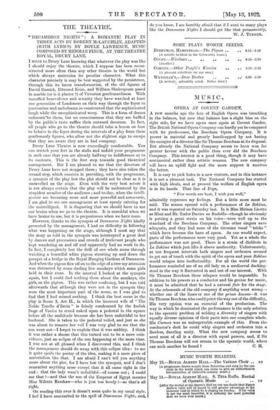THE THEATRE.
DECAMERON -NIGHTS " : A ROMANTIC PLAY IN THREE ACTS BY ROBERT McLAUGHLIN, ADAPTED (WITH LYRICS) BY BOYLE LAWRENCE, MUSIC COMPOSE]) BY HERMAN FINCK, AT THE THEATRE ROYAL, DRURY LANE.
I WENT to Drury Lane knowing that whatever the play was like I should enjoy the theatre, which I suppose has been recon- structed more often than any other theatre in the world but which always maintains its peculiar character. What this character precisely is may be best suggested by the persistence, through this its latest transformation, of the old figures of David Garrick, Edmund Kean, and William Shakespeare posed in marble (or is it plaster ?) of Victorian gentlemanliness. With unruffled benevolence and serenity they have watched at least one generation of Londoners on their way through the foyer to pantomime and melodrama so constructed that the sophisticated laugh while the unsophisticated weep. This is a form of drama unknown`to them, but no consciousness that they are baffled by the public's taste ruffles their outward decorum. In fact, all people who go to the theatre should take a lesson on how to behave in the foyer during the intervals of a play from these gentlemanly figures, who allow not the slightest sign to escape that they are aware they are in bad company.
Drury Lane Theatre is now exceedingly comfortable. You can stretch your feet in the stalls and unfold your programme in such ease that you are already halfway to indifference as to its contents. This is the first step towards good theatrical management. But I am pleased to see that the directors of Drury Lane have not stopped there ; they have also taken the second step, which consists in providing, with the programme, a synopsis of the play lest the plot should not be clear as it is unravelled on the stage. Even with the very best actors it is not always certain that the play will be understood by the stupidest member of the audience ; and to-day, when the intelli- gentsia are becoming more and more powerful and autocratic, I am glad to see one management at least openly catering for the unintelligent. It is disgusting that we should have to use our brains when we go to the theatre. It is unreaful when we have brains to use, but it is preposterous when we have none.
However, thanks to the synopsis of Decameron Nights kindly presented by the management, I had no difficulty in following what was happening on the stage, although I must say that the story as told in the synopsis was interrupted a great deal by dances and processions and crowds of irrelevant people who kept wandering on and off and apparently had no work to do. In fact, I completely lost the drift of one whole scene through watching a beautiful white pigeon strutting up and down the parapet of a bridge in the Royal Hanging Gardens of Damascus. And when the pigeon flew off on to the edge of a tree my attention was distracted by some darling live monkeys which some girls held in their arms. In the interval 1 looked at the synopsis again, but I could find nothing there about the monkeys, the girls, or the pigeon. This was rather confusing, but I was told afterwards that although they were not in the synopsis they were the most important part of the scene, so I was glad to find that I had missed nothing. I think the best scene in the play is Scene 3, Act IL, in which the innocent wife of " The Noble Torello d'Istria " is falsely condemned by the foolish Doge of Venice to stand naked upon a pedestal in the square before all the multitude because she has been unfaithful to her husband. She is taken to the pedestal veiled, and just as she was about to remove her veil I was very glad to 'see that the sun went out—I forgot to explain that it was midday. I think it was rather a shame that this turned out to be a mere coin- cidence, just an eclipse of the sun happening at the same time. I was not at all pleased when I discovered this, and I think the management should do away with this eclipse idea : to me it quite spoils the poetry of the idea, making it a mere piece of materialism like that. I am afraid I can't tell you anything more about the plot, for I have lost the synopsis, and I don't remember anything more except that it all came right in the end : that the lady wasn't unfaithful—of course not ; I could see that t—and that the son of the Emperor of Egypt marries Miss Wllette Kershaw—who is just too lovely !—so that's all right.
On reading this over it doesn't seem quite in my usual style. I feel 1' have succumbed to the spell of Decameron Nights, and, do you know, I am horribly afraid that if I went to many plays like the Decameron Nights I shOuld get like that permanently.
W. J. TURNER.


































 Previous page
Previous page